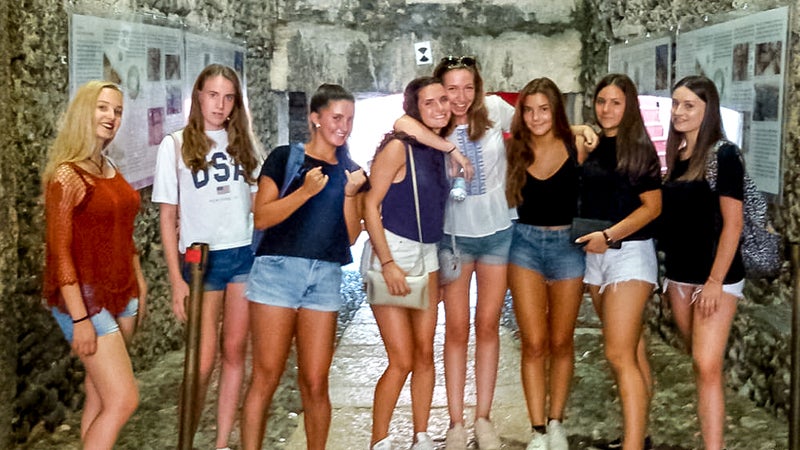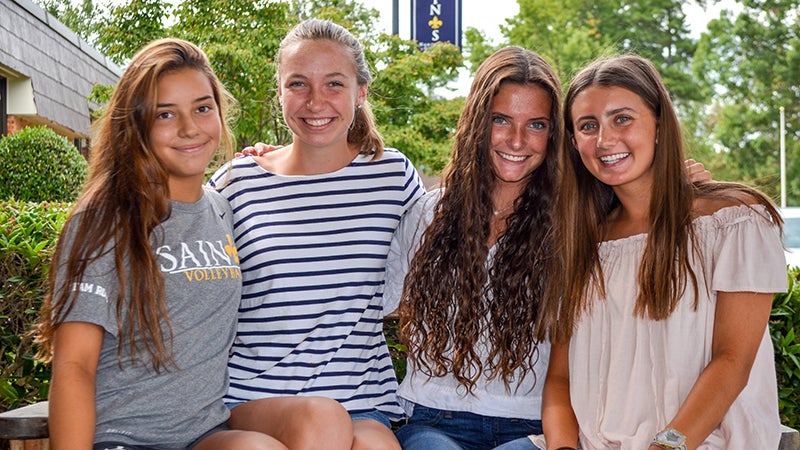NSA ladies experience Italian living
Published 9:53 pm Tuesday, August 21, 2018
It’s not often that American teenagers get to celebrate their Independence Day abroad, but three Nansemond-Suffolk Academy students and one recent graduate did just that inside a restaurant in the city of Portogruaro, Italy, this past summer.
Rylee Bono, 15, Sarah Meyers, 16, Sarah Wren, 16, and Kaylee Moore, an 18-year-old who just graduated from NSA and will attend University of Virginia this fall, were happily surprised when they were presented with a flaky, orange marmalade cake that evening. The words “Happy Fourth of July” were written on it beside a decorative American flag, and while there weren’t any fireworks, the cake’s lit sparklers were plenty festive.
The girls laughed alongside the host family at the table, sang “Fifty Nifty United States” that they remembered from elementary school and gave the other diners a confusing sight.
“Kaylee had on her ‘America’ glasses and everybody was just looking at us like ‘What are you doing,’” Wren said as she laughed. “We were singing ‘Fifty Nifty’ and the other people in the restaurant were just staring.”
The four NSA girls arrived at Venice Marco Polo Airport in late June to spend roughly two weeks abroad with Suffolk Sister Cities International. Created by President Dwight D. Eisenhower in 1956 to promote respect, understanding and cooperation worldwide, Sister Cities International actively unites tens of thousands of citizen diplomats and volunteers through more than 2,000 partnerships across more than 140 countries, according to sistercities.org.
Suffolk’s partnership began in 1981 with Suffolk County in England, and in 1995 added Oderzo, the Italian city where Amedeo Obici — the founder of Planters Peanuts and Obici Hospital — was born. Suffolk Sister Cities sponsors four students to participate each year in its summer exchange program with host families and volunteers in Oderzo.
“We feel that it’s really important to give these opportunities to youth, particularly some growing up in Suffolk who don’t get as many opportunities to encounter other cultures and ways of life,” said Maryanne Persons, commissioner and board member for Suffolk Sister Cities International. “We’ve had kids go to Italy who have never flown before, much less visited a foreign country.”
The girls admitted that it was strange to be in a brand-new setting on the other side of the Atlantic Ocean with little experience in speaking Italian.
“There are definitely moments where you’re like, ‘What am I doing here? This is so crazy. I’m just in this random town in Italy with this big family,’” Moore said.
They had to be extra careful of the language gap when they sat down for meals. At that same Fourth of July dinner in Portogruaro, Bono thought she had ordered a burger. She soon learned otherwise.
“The boy that was sitting across from me was translating for me, and he was like ‘oh yeah, this is really good, I’m going to get this,’” Bono said. “It was under ‘burgers’ and I love burgers, and it was made with something special, so I had that.”
She couldn’t remember the name of what she ordered, only that it tasted like “raw hamburger.”
“I tried really hard to eat it,” she said with a chuckle. “After like two bites I was like ‘I’m sorry, I don’t mean to be rude, but I can’t do this.’”
Fortunately, the rest of the girls’ meals were more than satisfying. They fondly recalled the handcrafted pizzas and pasta dishes that were thinner, softer and better in texture than what you would find in the States, Meyers said.
Moore said her host family was especially accommodating.
“I was nervous because I’m like a picky eater, and I never said I didn’t like anything, but they always made something else for me just in case I didn’t like it,” she said.
She and the other girls were especially fond of the gelato, particularly the “stracciatella” variety with fine shavings of chocolate mixed in.
“It was so refreshing. You would eat it and be like, ‘Wow I feel good,’” Meyers said.
They said the best gelato they had was when they visited the Dolomites, a mountain range in northeastern Italy. The girls hiked up and down mountains, swam in the cold water of the Adriatic Sea and got some sun on the beaches.
Wren’s host family lives in Portogruaro — roughly 45 minutes driving from Oderzo, where the three others’ host families live — and with her hosts she visited 13 different cities in Italy. She kept a list on her phone and was quick to pick Bologna as her favorite for its stunning artwork and beautiful churches and architecture that go as far back as the 1200s, she said.
“It was just crazy to think that they could have built stuff like that and it’s still standing today,” she said.
When the four were in Verona they shopped, dined and visited Juliet’s House — a popular tourist spot based on “Romeo and Juliet” — before they visited another historic marvel: the Verona Arena, a Roman amphitheater built in the first century A.D. that’s transformed into the world’s largest open-air opera theater each summer, according to the Arena Foundation’s website.
“The stairs were super steep, but once you climbed all the way to the top you could see the entire city,” Wren said.
Throughout their travels, the girls noticed striking differences between living in an Italian city and one in Hampton Roads. It was more than just the gorgeous architecture, the Wednesday night festival music and dancing in Portogruaro or the expansive market booths that packed city streets.
“They really just had everything, and it was really big,” Moore said. “You would just go down so many streets and it would just keep going.”
According to Bono, it seemed like there was more freedom to stay out late at night as a teenager. She described biking out to the square with her host family’s children or her NSA compatriots, staying out until 2 a.m. and riding back without any concern.
“I never felt like I was in danger if I got separated or if I was by myself because I didn’t speak Italian. There was someone somewhere that spoke English, or someone that didn’t speak English but who would still help me,” she said.
They agreed that most of the locals were friendly, especially their host families. Bono said her host parents talked to her like they did with their own children, both with smiles and occasionally a parental “no.”
“They were treating me like I was one of their kids. It was really nice,” she said.
Meyers helped her host mother’s 8-year-old son practice his English — with questions like “is Joe a girl or boy’s name,” she said — while Moore’s host parents sometimes stumbled on the English words for “garlic” and “turkey.” They ended up using “Dracula” and “Thanksgiving” instead to get their points across.
She recalled watching the World Cup with her host dad, a businessman in the automobile industry who travels internationally for work. Apparently, he had business in Croatia.
“He would always be rooting for Croatia because he was going to Croatia the next day. He was like, ‘good for business,’” she said with a chuckle.
Persons explained that the mottos of Suffolk Sister Cities are “peace through people” and “building international and global understanding through friendships, one handshake at a time.”
The Italian teens that visited Suffolk got to practice their English just like the visitors to Suffolk earlier this summer got to practice their Italian, and both parties got to learn about a new culture in a way that wouldn’t be possible otherwise.
“It’s different than just going over and doing all the touristy stuff, because you’re living with the family and you get to see what it’s actually like to live there,” Meyers said. “You get the cultural differences and everything.”
Wren’s last dinner with her host family lasted for about three hours, she said. They sat at the dinner table as her host dad translated stories from the grandparents. She learned about the grandfather’s life and the family’s history as they talked into the night. She said it was one of her favorite experiences in Italy.
“I definitely felt like a big part of the family at that point,” she said.







